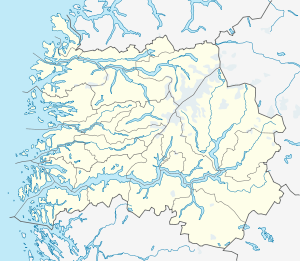Jervvasstind
| Jervvasstind | |
|---|---|
 Seen from Fannaråki | |
| Highest point | |
| Elevation | 2,351 m (7,713 ft) |
| Prominence | 120 m (390 ft) [1] |
| Listing | 9 at List of mountains in Norway by height |
| Coordinates | 61°27′53″N 07°54′40″E / 61.46472°N 7.91111°ECoordinates: 61°27′53″N 07°54′40″E / 61.46472°N 7.91111°E |
| Geography | |
 Jervvasstind Location of Sogn og Fjordane | |
| Location | Luster, Sogn og Fjordane, Norway |
| Parent range | Hurrungane |
| Topo map | 1517 IV Hurrungane |
| Climbing | |
| First ascent | 1876: William Cecil Slingsby, Emanuel Mohn, and K. Lykken |
| Easiest route | Climbing |
Jervvasstind (also known as: Gjertvasstind and Østre Styggedalstind) is Norway's ninth-highest mountain. The 2,351-metre-tall (7,713 ft) mountain lies in the Hurrungane mountains in the eastern part of the municipality of Luster in Sogn og Fjordane county, Norway. It lies on the eastern end of a mountain ridge including the mountains (west to east) Store Skagastølstind-Vetle Skagastølstind-Sentraltind-Store Styggedalstind-Jervvasstind. The village of Skjolden is located 16 kilometres (9.9 mi) to the west.[2]
Name
The first element is the genitive of the name of the lake Jervvatnet and the last element is tind which means "mountain peak". The first element in the lake name is jerv which means "wolverine" and the last element is the finite form of vatn which means "water" or "lake". The old form "Gjertvasstind" is wrong and misunderstood (there is no word "gjert" in the Norwegian language).
First ascents
The first recorded ascent was by William Cecil Slingsby and Emanuel Mohn in 1876. The first winter ascent was by Arne Randers Heen and Ernst Bakke in 1953.[3]
References
- ↑ "Toppomania - Jervvasstind 2351 moh".
- ↑ Store norske leksikon. "Gjertvasstind" (in Norwegian). Retrieved 2010-09-11.
- ↑ Lauritzen, Per Roger, ed. (2009). "Jervvasstind". Norsk Fjelleksikon (in Norwegian). Arendal: Friluftsforlaget. ISBN 978-82-91-49547-7.